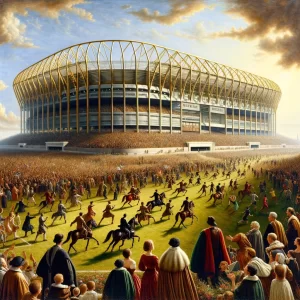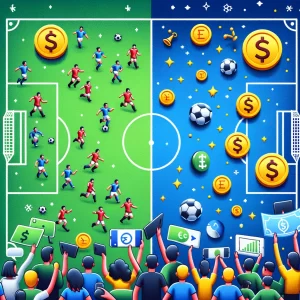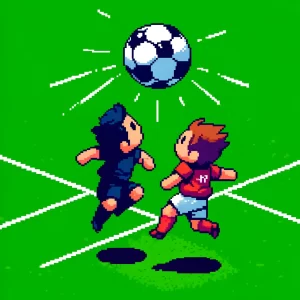
The Video Assistant Referee (VAR) Revolution in Soccer: A Balancing Act of Fairness, Accuracy, and Tradition
In 2018, the soccer world witnessed a significant technological advancement with the introduction of Video Assistant Referees (VARs), reshaping the dynamics of the most beloved sport globally. This move towards digital officiating aims to uphold the authenticity and emotional richness of soccer while enhancing decision-making accuracy through technology. But as we integrate such advanced systems into traditional sports, are we striking the right balance between maintaining the game’s essence and embracing modernity? This blog explores the complexities of VARs in soccer, weaving in philosophical insights from Immanuel Kant and highlighting the implications for coaching and player development.
The Heartbeat of Soccer: More Than Just a Game
Soccer, or football as it’s known outside North America, is more than just a game; it’s a reflection of life’s highs and lows, a battleground for glory and heartbreak, mirroring societal conflicts but without the violence. With roots deep in cultural traditions, every goal scored is a narrative of triumph and disappointment, experienced in real-time by millions.
The implementation of VARs, however, introduces a pause in this narrative. The immediacy of joy or despair following a goal is now often replaced by anticipation and doubt, awaiting the verdict of a video review. This change has sparked a debate: Does technology enhance the game by correcting human errors, or does it dilute the raw emotion that makes soccer so captivating?
Enhancing Fairness and Accuracy with VAR
At its core, the VAR system aims to rectify clear and obvious errors in game-changing situations such as goals, penalties, and direct red card incidents. By doing so, it seeks to bring a level of fairness that was sometimes missing due to human error in fast-paced matches. For coaches and players, this means adapting to a new layer of tactical and psychological dynamics. Players might alter their behaviors, knowing that every action could be scrutinized closely, potentially reducing instances of diving or simulation.
From a coaching perspective, understanding and adapting to this new system is crucial. Coaches must now consider the impact of possible interruptions and prepare strategies that include managing players’ stress and expectations during VAR checks. This adds a new dimension to soccer training programs focusing on psychological resilience and adaptability.
The Controversy: Flow and Authenticity
Despite its intentions, VAR has not been without controversy. Critics argue that it disrupts the game’s flow, introduces subjective interpretations of rules, and shifts the focus from on-field refereeing to off-field decision-making. This technological intervention is seen by some as a challenge to the purity and spontaneity of the sport.
The philosophical angle, inspired by Immanuel Kant, could offer a fresh perspective on this debate. Kantian ethics suggest that actions are justified if they enhance fairness and fulfill moral duties—principles that align with the core objectives of VAR. Yet, Kant also emphasizes the importance of human autonomy and judgment, hinting at a potential conflict between technological assistance and the intrinsic value of human referees’ decisions.
Balancing Act: Technology and Tradition
Finding the balance between leveraging technology and retaining the game’s human element is key. The ongoing refinement of VAR protocols aims to minimize disruptions while maintaining transparency and trust among players, coaches, and fans. For the future of soccer coaching and player development, embracing both the technical and traditional aspects of the game will be essential.
Engaging with the Future
As we continue to debate and refine the use of VAR, engaging with all stakeholders—coaches, players, and fans—is crucial. By understanding the diverse perspectives and emotional investments in the sport, the soccer community can work towards a consensus on how technology should be used to enhance the game.
Conclusion: The Game Evolves
The introduction of VAR in soccer is a testament to the sport’s evolution, reflecting broader trends in technology integration across various sectors. While challenges remain, the potential for technology to improve fairness and accuracy in soccer is undeniable. As we move forward, it is the responsibility of everyone involved in the sport to ensure that soccer remains a thrilling, fair, and emotionally engaging sport.
Step into the forefront of soccer innovation with ‘This Week in Soccer’.
Our newsletter is more than just words; it’s an interactive journey through the complexities of soccer analytics and strategy. Whether you’re a coach, educator, or enthusiast, our content is designed to spark curiosity and enhance your understanding. Subscribe today and be part of a community pushing the boundaries of soccer education.
About the Author
Jon Scaccia is a youth soccer coach and translational scientist. He has worked with the Exeter United Soccer Club for over five years, focusing on U5 development. In his day job, he works in data evaluation and implementation science.



